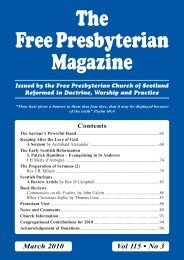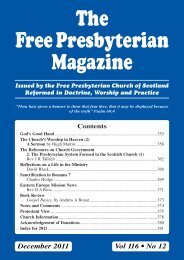February - the Free Presbyterian church of Scotland
February - the Free Presbyterian church of Scotland
February - the Free Presbyterian church of Scotland
Create successful ePaper yourself
Turn your PDF publications into a flip-book with our unique Google optimized e-Paper software.
42<br />
The <strong>Free</strong> <strong>Presbyterian</strong> Magazine<br />
laid <strong>the</strong> foundation stone <strong>of</strong> <strong>the</strong> original <strong>church</strong> on 1 July 1824. A stone building<br />
with a plain steeple and seating 1000 people was opened for worship on<br />
16 July 1826. A manse was built next to <strong>the</strong> <strong>church</strong> and so was, soon afterwards,<br />
<strong>the</strong> Australian College – a centre <strong>of</strong> learning. Subsequently, Lang<br />
became its principal, and it paved <strong>the</strong> way for Sydney University. This was<br />
<strong>the</strong> first general college <strong>of</strong> higher education in <strong>the</strong> colony. Glasgow University<br />
awarded Lang a Doctorate in Divinity in 1826. 2<br />
Lang was an accomplished orator whose influence as a Christian minister<br />
was to be felt in <strong>the</strong> colony for more than 50 years; he made an enormous<br />
contribution to education, politics and journalism. He also served as a member<br />
<strong>of</strong> <strong>the</strong> NSW parliament for more than 25 years and, on several visits back to<br />
<strong>the</strong> UK, Dr Lang was successful in recruiting ministers and settlers to emigrate<br />
to NSW. Such was <strong>the</strong> dissipated and immoral nature <strong>of</strong> convict society that<br />
he and o<strong>the</strong>rs believed that <strong>the</strong> land could only prosper with an influx <strong>of</strong><br />
God-fearing and industrious settlers that would outnumber <strong>the</strong> convict population,<br />
bring an improved moral tone and set about building a new empire<br />
in <strong>the</strong> south.<br />
Those Scots <strong>Presbyterian</strong> settlers who arrived in response to Lang’s plea<br />
for emigrants were <strong>church</strong> members; many <strong>of</strong> <strong>the</strong>m were Lowlanders, <strong>of</strong>ten<br />
from <strong>the</strong> Secession <strong>church</strong>es, and some were Gaelic-speaking Highlanders<br />
and Islanders. They brought with <strong>the</strong>m a high esteem for <strong>the</strong> Scriptures and<br />
a love <strong>of</strong> <strong>the</strong> Sabbath day, as one writer recalls: “Our pioneering forefa<strong>the</strong>rs<br />
reverenced <strong>the</strong> Fourth Command very deeply. . . . All manual labour, unless<br />
in dire emergencies [such] as a bushfire or a flood, was suspended on Sundays,<br />
and even domestic tasks were cut down to a minimum. The housewives<br />
would have been horrified at having any washing seen out on <strong>the</strong> line on <strong>the</strong><br />
Sabbath, while Sunday sport was a thing unheard <strong>of</strong>.”<br />
As a <strong>Presbyterian</strong>, Lang held views on <strong>the</strong> roles <strong>of</strong> Church and state which<br />
were opposed to those <strong>of</strong> <strong>the</strong> Anglicans who established and ran <strong>the</strong> colony.<br />
As time passed, Lang’s relationship with <strong>the</strong> Anglicans deteriorated to <strong>the</strong><br />
extent that after 11 years in <strong>the</strong> colony, Lang was to say <strong>of</strong> it: “The greatest<br />
calamity that has hi<strong>the</strong>rto befallen <strong>the</strong> Australian colonies, in regard to <strong>the</strong>ir<br />
moral and religious welfare, is <strong>the</strong> prevalence <strong>of</strong> a jealous, exclusive and<br />
intolerant system <strong>of</strong> Episcopal domination”. 3<br />
Lang was greatly incensed that Church <strong>of</strong> England clergymen like Samuel<br />
Marsden acted as civil magistrates, dispensing secular punishment while concurrently<br />
maintaining <strong>the</strong> spiritual oversight <strong>of</strong> <strong>the</strong>ir flocks. He also believed<br />
2 D W A Baker, Days <strong>of</strong> Wrath: A Life <strong>of</strong> John Dunmore Lang, Melbourne University<br />
Press, Melbourne, 1985, p 42.<br />
3 Ken Inglis, Australian Colonists, p 90.

















